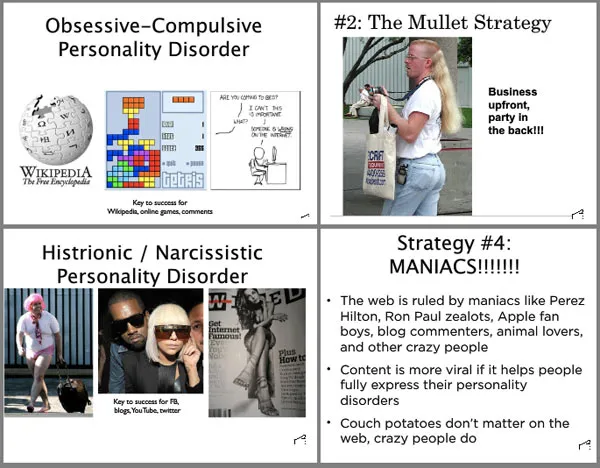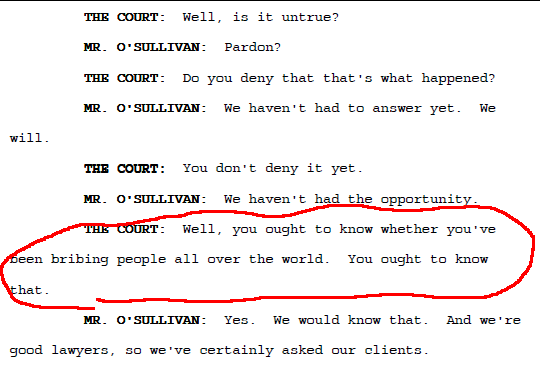How to buy 1 facebook ad in 5 months or less
Last summer I made a facebook account, because they are the best deal in CAC and also because my marketing skillset is 7 years out of date. I clicked a prompt saying to make an ad, clicked a button to auto-create a creative, got billed $2, and got blocked.
Actually I’m not sure if I was blocked. My account status changed over time (my ad account was disabled, or my page was in trouble, or my payment account was broken). I couldn’t buy ads.
Eventually I graduated from chatbot support and was told to expect a call in fifteen minutes. This seemed weird (all I want is to buy something from you), but as a good consumer of institutional products, I reminded myself to BREATHE, and killed some time reading their ads rules.
Where I found this:
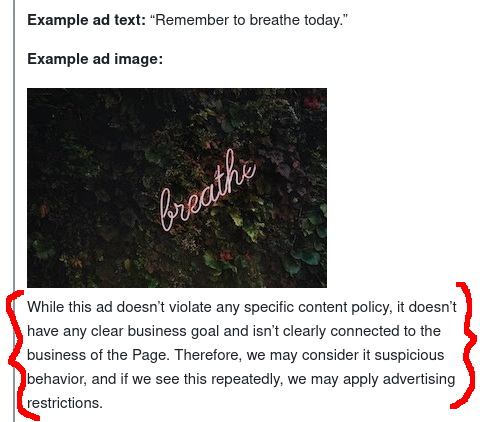
This ad doesn’t violate our policies -> breathing is superfluous in business -> everything not compulsory is forbidden -> BLOCKED. Thus enlightened, I still needed a compliant mantra. I picked this line from the facebook south park episode:
I was seriously going to say it if negotiations broke down. Luckily they never called that night. (They did email to say their phones broke1). Ha ha ha ha.
This post is a compendium of bad thoughts on transparency, rules, risk, and the internet’s middle class from the long, dark winter (autumn) of my account being down.
- Risky business
- Double secret probation
- Self-serve is a mullet
- Resolution
- Life in the long tail
- Notes
Risky business
If your main news source is the juicy-douchey axis of industry forums, you’ve seen your share of posts in the genre of ‘account locked, no explanation, no support, prayer for relief’.
When these hit the front page and sides are taken, one of the sides is ‘are you the criminal’2.

More nuanced take: this is about risk. All platforms have risk from their users, but the screenshotted thread is about stripe; payment processors have a lot of risk and it is highly quantifiable.
The innovation of productized payment processors like paypal / stripe, compared to process-heavy alternatives, is to onboard anything that moves, and then decide afterwards if their fingers were crossed3. Useful comment from the same thread:
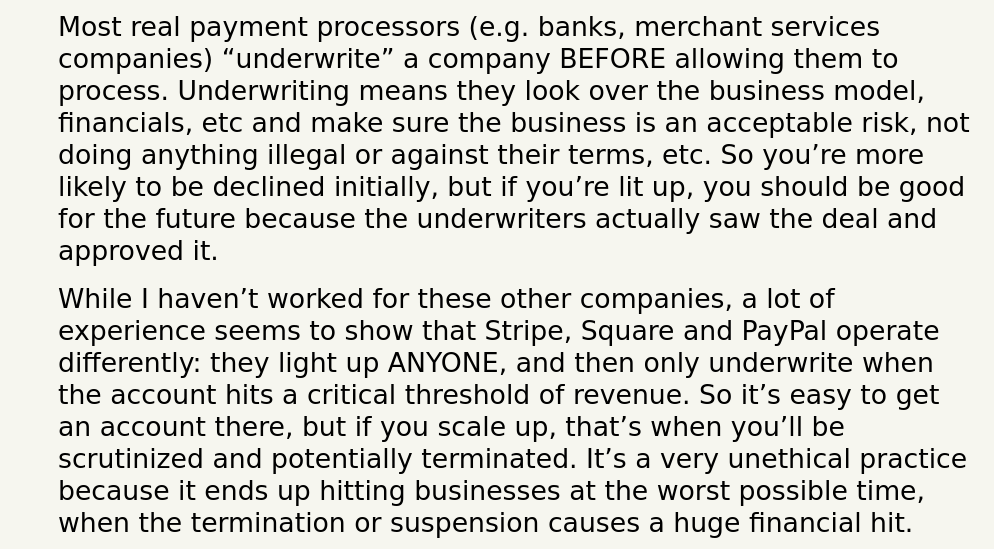
I’m guessing that when an investigation flags something, you’re in a catch-22 of platform liability: ignoring you and keeping your money is less risky than transferring any money to you, or even admitting that they can’t. (I’m guessing).
In fairness the payment processors are at the mercy of bigger fish, like regulators and real banks, who enforce manichean ban rules on aggregate traffic. But as with all risk relationships, ambiguity is resolved at the sharp end4. The processors push risk down to their customers.
Another notable ban from 2022 is a dad who gmailed photos to a doctor5. Google told the cops, the dad went public. If you believe the ‘are you the criminal’ theory of public appeals, this is dark.
If, on the other hand, you believe my ‘equal parts real, malicious, random, and incompetent’ razor for all unaccountable systems, there is a 50% chance google trusted a semi-working image kernel to accuse someone of a crime. There’s a 25% chance they lied to frame him.
Don’t give platforms the benefit of the doubt when they won’t comment.
In the stripe ban, they took the person’s money. Maybe the poster is lying or deserved it. Maybe I was the lizard man who stole your precious serum. But it would be so easy for stripe to join the chat. My guess is platforms stay quiet because of Mark Twain logic – the reputational harm from the accusations is not as bad as the truth.
Double secret probation
I never got a straight answer about my facebook block. Their internal messaging never converged on what the problem was. No idea if these screenshots were simultaneous (I rescued them from my twitter), but they seem to be saying:
- The ad violates policies (all of them, apparently). But they instruct me to try again.
- In fact it’s not a policy issue, the page is disabled. (A page, if you’re not fluent in the lingo, is a type of account).
- In fact the page is disabled because the ad was disabled.
- And also the page is fine. Ha ha ha ha.

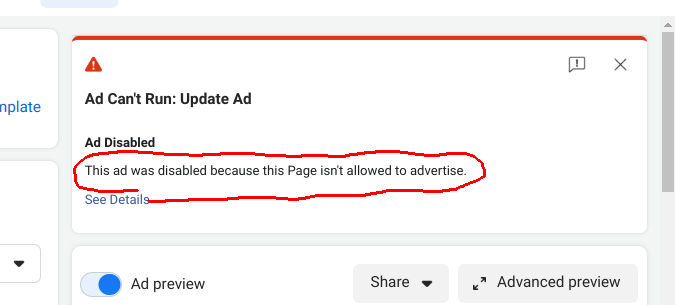
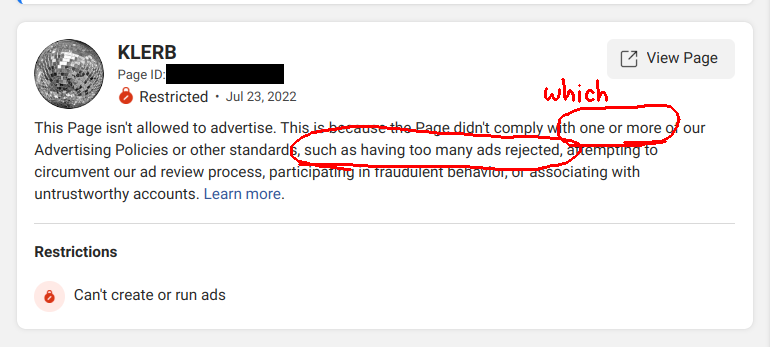
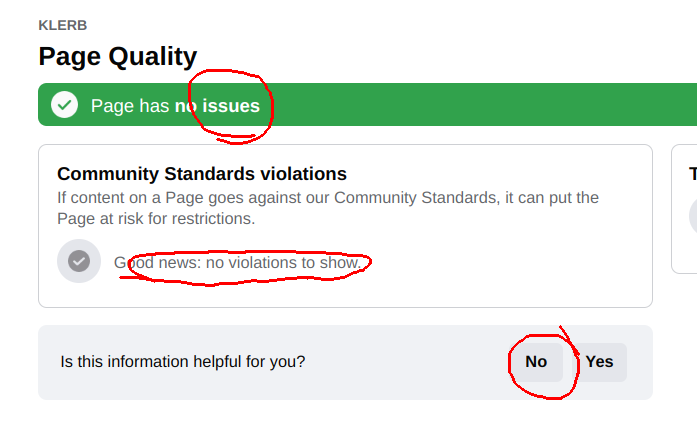
Right after I wrote this section, my writing playlist cued up this All Saints lyric:
Not only will your answers keep me sane,
but I’ll know never to make the same mistake again
No comment on whether fb’s answers kept me sane, but the folder where I keep those screenshots has 183 screenshots.
I don’t blame them for having a bug. I do blame them for hiding problems so well their support staff can’t tell which system is broken. When I finally (much later) got someone on the phone, I asked ‘what exactly caused my account to get flagged’. He said ‘this information could be used by bad actors, so we don’t share the exact policy violations’.
Curious, I asked him if anyone at facebook knew what the problem was. He said there might be someone who could find out, but probably not.
Which is fine. And maybe I’m just an edge case. But a system can be made entirely out of edge cases, like a suit made entirely from zippers. If every account is broken in a different way, support and appeal channels become the primary user interface, and need to be empowered. Extrapolating from my experience, facebook is not empowering support.
Which is also fine. But (if) the complex setups are mainly business users, you’d think they’d want to add support, because support = onboarding = sales.
This is just facebook, so who cares. But god forbid tools this bad are ever used for anything important.
Self-serve is a mullet
I like buzzfeed’s mullet model6 as a way of understanding things that contain opposites. Facebook support is a mullet. It can only be compared to non-broken systems if you accept that 90% of it can be in a constant state of crisis, but it can still have business in the front.
All of self-serve ads is a mullet. Remember when twitter laid off a bunch of account managers and, in the process, accidentally laid off their advertisers? I saw a comment like ‘advertisers can just use the dashboard’ and a reply like ‘the dashboard has never fully worked’.
I kind of believe this. The google ads dash is written in transpiled dart that has crashed every laptop / browser combination I’ve tried, and the onboarding wizard is the buggiest part. It’s hard to break onboarding if you have any product metrics at all. A recent change sunsets the ability to specify non-random text in ad titles (!!), but every search ad I’ve ever seen has obviously non-random title text – they’re all emailing their account rep, every last one of them.
The self-serve dash is the party side of the mullet.
I said above facebook under-invests in appeals. This is only mostly true. Their xcheck7 layer protects journalists, ‘business partners’, and other VIPs, because ‘in the current business landscape’ (says the FOB writeup), alienating their actual source of revenue + content could be a mistake.
And that’s fine. The coke bear and the budweiser clydesdale get a red phone to superbowl producers; the audience doesn’t need one. I’m not knocking fb for being a responsible steward for their customers and athletes; I’m knocking them for pretending the non-VIP systems are in any way functional.
People below the xcheck threshold, or the ‘account manager assigns you personhood’ threshold on any platform, are seeking help on forums because contrary to apple’s misguided and funny attempt to impose omerta on their customers, if you run to the press and trash us, it gets results. I get platforms don’t want mob rule, but they aren’t offering anything better.

(twitter / carnage4life)
Top apps can work around this unless apple is in a mood. But for the internet’s middle class, there’s nobody on the other end of the fax machine. If there’s an AI in charge of block + fraud ops, the AI is Loab, the incarnation of the internet’s suppressed id. Self-serve is haunted.
And we know nothing of exorcism.
Resolution
For a while you could buy a quest to get enhanced support on your facebook account, and then return it. They added a third account type so who knows if this still works. For now, at least, you can still seduce metamates to reinstate your insta8.
In conclusion, I’m running for president too, please let me buy one ad on your site … is how I was going to end this. But that joke is in increasingly bad taste, and also something amazing happened.
First, in december, I resubmitted my ticket for the Nth time, and a human being called me on the phone. We talked for 40 minutes. He couldn’t share the exact policy violation because it could be used by ‘bad actors’ and also because nobody, he clarified when I followed up, nobody at facebook knew what it was.
But he also gave me a bunch of useful advice. His job is to have these calls without full information, and he had become skilled at reading the system’s weather and subtle moods.
He said the lack of organic content on my page is a concern, and also my account didn’t have a photo. FWIW I had been through their photo ID + notarized address verification process to do social issues advertising, not because I want to do social issues advertising but because it was the only non-broken ID verification flow. (I use ‘non-broken’ here in the loosest sense).
The agent said I should start by making organic content and then boosting it. This means the steps are:
- create content for free that is of good quality
- pay facebook to show the content that I made for them
- do this enough, and I’ll be allowed to pay them to show the content I make for me
I always hear ‘organic’ in this voice:
One thing all the agents said was ‘hire an agency to post your ads’. They have seen too much to pretend the self-serve system is fully baked.
fb’s design makes it hard to identify business customers: buying anything from them requires a personal account first, but now I have a page, biz manager, insta, + a workplace account I made to prove to them that my credit card was valid. Can you not just start me off with biz manager? I would pre-pay for ads to cover the cost of business entity verification.
I don’t think moderation or reputation gating is evil. Twitter used to require a certain amount of organic engagement before they let you buy an ad. But twitter said so. If facebook is doing the same thing, they should say so.
As I boost my content to earn the right to advertise, and look at the engagement stats, I’ll see stuff like ‘7k impressions! 5k reach! 700 engagement! 350 sponsored engagement!’. This is for a post with 9 emoji reactions, by people who are outside my target geography. What are the other 693 engagements? I wonder if they’re misclicks.
Simultaneously, I’m seeing this okay and good content that is fine and performing great:

The phone call wasn’t the amazing thing that happened. The next day, my guy called back to tell me there was a payments bug affecting my account, it’s been fixed, and I’m good now. That is more or less the end of my story.
But the second call wasn’t the amazing thing either. What happened was that I came as close as I have ever come to getting phished.
Life in the long tail
(This is the post-credits scene. Subscribe you animal, it’s free and it makes me write more).
I got an email from Faaaaacebok@hotmail.com (or something) about copyright infringement. It contained a non-hyperlinked link of a random facebook post for an ‘IP Enforcement’ page, which in turn linked to meta oversight dispute dot com (or something), which was a copy of their help page but none of the links worked.
As I clicked through I was thinking to myself ‘wow, this is bad’, but continuing because it wasn’t worse than their normal flows. The normal ‘facebook needs you’ formula is:
- completely new communication channel (email, sms, push, in-app notification in different account)
- ‘something is wrong’ but the ‘something’ is a random link to their terms
- forwards to new dashboard that I’ve never seen, often with a ticket that has already been closed
- the button I’m supposed to press is broken, then I have to log in to a new support desk or chat client which somehow logs me out of my normal account
- the agent has no context and asks me for all my account #s and a screenshot or two
It’s like the apple bozo bit blogpost. ‘With this, I noticed that I hadn’t actually expected better’. It was like vishnu appearing to oppenheimer except ‘now I am become spam’. Facebook has glutted itself on spam and hard mast for so long their admin dashboard is spam now too.
I reported the phish post to facebook and they eventually came back like ‘LGTM’. And so I’m sitting here on the group W bench. I’ve been blocked, but apparently it’s okay to impersonate facebook’s entire support site to harvest credit cards, or IDs, or trick people into installing something. They sold someone an ad for genocide, hopefully not with conversion tracking.
The main advice I got from marketing friends who heard excerpts of all this is ‘yeah that happens a lot’, pause, remember what year it is, ‘why are you on facebook’.
Eventually I tried a boosted post on instagram and had the same experience – it ran for like a second and then got taken down. I don’t know why. My browser can’t log in to fb and insta at the same time, and the admin dashes have gotten even more complicated since adding the insta account, and do I even want to know? I finally read the cold start problem and convinced myself I shouldn’t be on paid social yet.
I thought my point was ‘I’m in the internet’s middle class, I pay my taxes, and I deserve better’. But am I? I thought I was bathypelagic, but maybe I’m in the abyssal zone where no sunlight reaches.
For a while my point was that Mr Lumberg told me to talk to payroll, and then payroll told me to talk to Mr Lumberg, and I still haven’t received my paycheck, and he took my stapler, and never brought it back.
After a while the point was ‘moderation isn’t free and the internet’s middle class needs to pay its taxes’. But that’s wrong too. I don’t think facebook wants to treat me this bad. They’re piloting a $12/mo fee for support for australians who get carsick in the quest.
The way I feel now is this:
The stigmergic excreta masquerading as the rules, settings and instructions of these platforms have no relationship to how they actualy function. Rather than treating any textual cue on their website as guidance, I should have remembered this graffiti’d footnote to the turnoff for a Columbia BC logging trail:
google maps sent you here to die. In other words, get advice from experts, and when something goes wrong, get somebody on the phone.
And BREATHE – even when the rules say not to.
Notes
-
dear slim I wrote you but you still aint calling (email of july 27th)
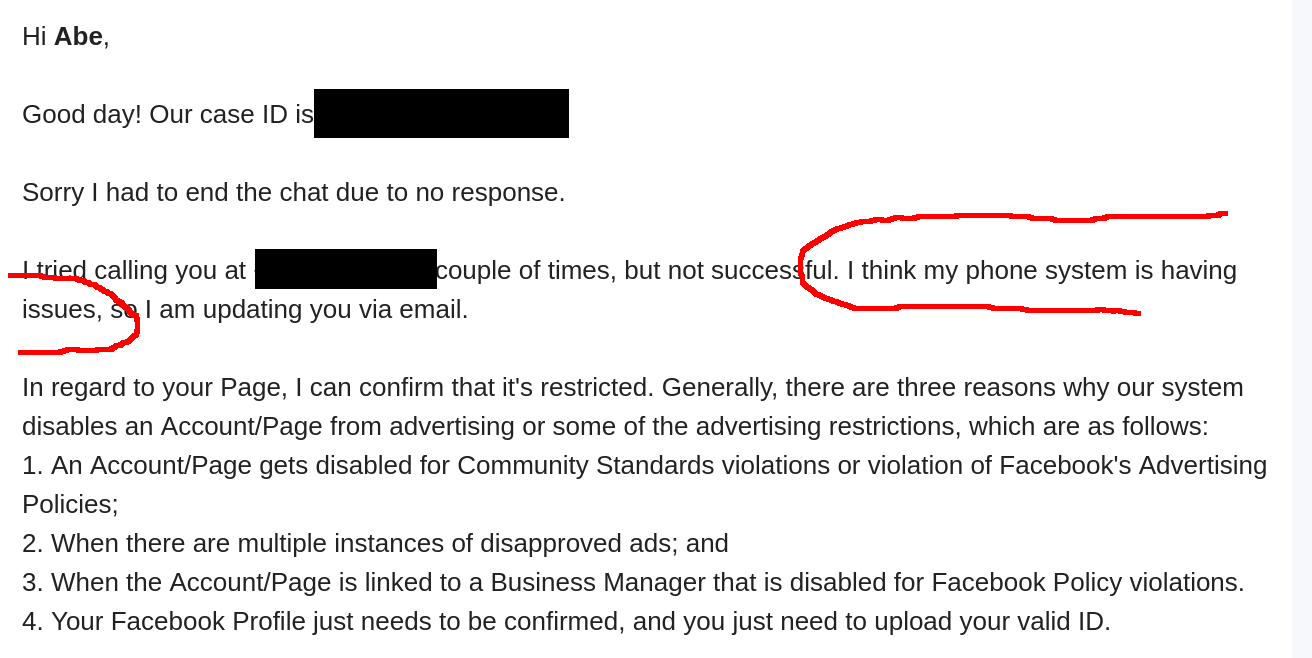
note the list of ‘reasons our system disables an account / page from advertising or some of the advertising restrictions’ – the agent has no idea what’s wrong. it’s not their fault, it’s a mystery. ↩
-
both screenshots here are from Stripe has decided to nuke my entire business 9/15/2022 on HN ↩
-
I don’t work in payment processing and don’t have deep context for these claims, but some sources: nerdwallet SEO article on payment processors saying:
they don’t require underwriting to sign up. So to manage liability, they reserve the right to freeze or terminate your account
See also paypal business risk management doc, braintree periodic reviews, simple seller protection’s what to do for paypal reviews wiki. ↩
-
Organizations are ambiguous, often intentionally, about the relationship between production targets, efficient use of resources, economy and costs of operations, and acceptable risks of low and high consequence accidents. All ambiguity is resolved by actions of practitioners at the sharp end of the system.
-
guardian with original story in august 2022. IMO guy’s actual mistake was using google fi. Obviously you don’t want your cell phone tied to an account that can get revoked for no reason. OAuth is a huge mistake for consumers.
nyt followed up on google CSAM policies in december. Google said they’d “provide more detailed reasons for account suspensions” (i.e. any reason), and “allow users to submit even more context” in their appeal, i.e. any context. ↩
-
Jonah Perretti (of BuzzFeed + HuffPo), mullet / viralness slideshow, via boing boing. Note slide 4 which says you can rule the internet by subscribing to my blog.
-
guardian article, oversight board xcheck writeup. The oversight board is simultaneously impressive and a distraction. It has the former Blackmun clerk who wrote the dissent in Bowers v Hardwick, which is neat, but doesn’t impact the scaled operations of a global company.
There’s a clause in europe’s proposed DSA which requires alternative dispute resolution for every platform dispute. I think it misses the point. Giving everyone an appeal is maybe secondary to ensuring that platform action is transparent. Transparency lets outsiders detect when something big is wrong. Arbitration is expensive or bad, pick any 2. Transparency enables class-action style intervention, which enables cases to pay more attention, design real fixes, and follow up. ↩
-
if you have the means, another way is to bribe nick clegg to report your competition to the GIFCT. Amazing exchange with bill alsup channeling alanis:
